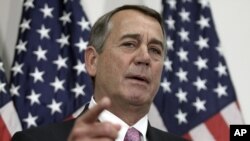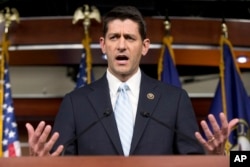The White House and John Boehner, the retiring Republican leader of the U.S. House of Representatives, lobbied lawmakers Tuesday to approve a new government spending plan and increase the country's borrowing authority, even as conservative Republicans attacked the deal.
President Obama urged lawmakers to pass the deal worked out in weeks of negotiations with congressional leaders and avoid getting sidetracked “by ideological provisions that have no place in America’s budget process.”
Treasury Secretary Jack Lew said the new deal will help the middle class, keep the nation safe, and create an additional 340,000 jobs.
Vice President Joe Biden called the agreement, worked out in weeks of negotiations with congressional leaders, "a good deal."
Boehner, who is leaving Congress later this week, said, "The agreement isn't perfect by any means."
But Boehner said the alternative was worse since it would have meant approving an increase in the country's borrowing authority beyond the country's current $18.4 trillion debt load without at the same time adopting some reforms to cut spending on the country's burgeoning pension and health care programs for older Americans.
Several conservative lawmakers, who have long chided Boehner for making deals on spending and key policy issues with Democratic President Barack Obama, complained about the deal. They said it broke a 2011 pact limiting spending and bypassed rank-and-file lawmakers in deciding to boost spending by $50 billion in 2016 and another $30 billion in 2017.
Congressman Paul Ryan, Boehner's presumptive replacement as House speaker, joined in the criticism.
"I think this process stinks," said Ryan. "This is not the way to do the people's business. Under new management, we're not going to do the people's business this way."
But several conservative lawmakers said they expect the House will approve the deal when it votes Wednesday, with almost all Democrats and more moderate Republicans favoring it. The Senate also must approve the deal before sending it to Obama for his signature.
Boehner negotiated the deal with the Senate Republican leader Mitch McConnell, as well as House Democratic leader Nancy Pelosi and Senate Democratic chief Harry Reid.
Spending plan
The plan would fully fund the federal government and extend the government's debt ceiling, or borrowing authority, through March 2017, two months after Obama leaves office. The plan boosts spending for both military and domestic programs by the $80 billion figure, as well as an extra $16 billion a year for the Pentagon's overseas war fighting budget. The extra funding lifts the automatic spending limits that had been imposed by the 2011 budget deal.
The extra spending would be offset by long-term savings to the Social Security Disability Insurance program and a cap on payments to health care providers by Medicare, the federal government's health insurance program for senior citizens.
The plan must be approved by the House and Senate and signed by Obama before next Tuesday, November 3, when the government's current borrowing authority expires and the nation faces a first-ever default on its debt obligations. Congressional leaders would then enter into negotiations to determine how to fund individual government agencies before December 11, when a temporary spending plan expires.
Another fast-approaching deadline is this Friday, when Boehner's resignation is effective. Having been forced out by hardline conservatives angry over his willingness to negotiate with Democrats, Boehner wanted to complete the spending and debt ceiling deal before leaving office, so that Ryan would not immediately face a contentious political debate in his first days as the House speaker.
The House Republican caucus is set to formally pick Ryan as its choice for House speaker on Wednesday, with the full House expected to ratify the choice on Thursday.
Some material for this report came from AP, AFP and Reuters.














